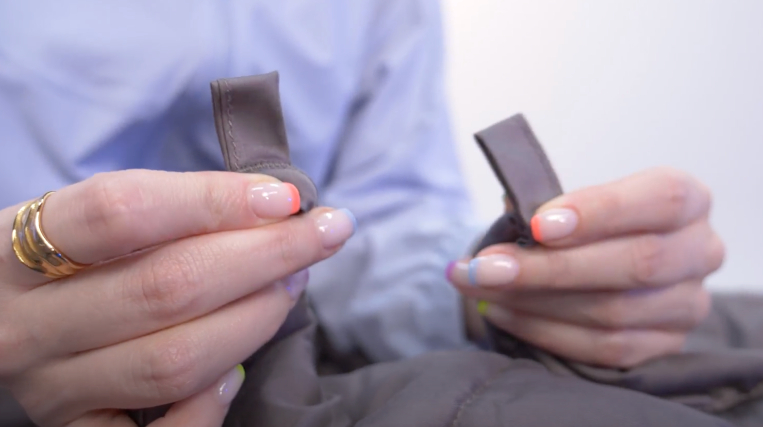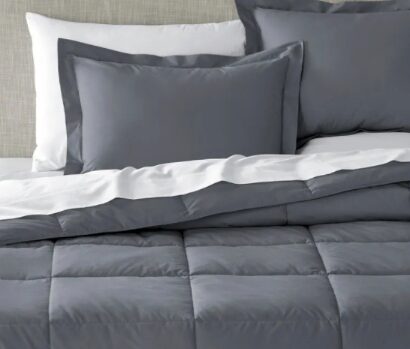Duvet Cover vs. Comforter: What’s the Difference?
Not sure if a duvet cover or a comforter is best for you? Read on to learn more about the pros and cons of each.
Disclosure: By clicking on the product links in this article, Mattress Nerd may receive a commission fee at no cost to you, the reader. Read full disclosure statement.
Deciding which kind of bedding to use can be as important as choosing the bed itself. While duvet covers and comforters both have a similar purpose, they also have different designs and benefits.
What is a Duvet Cover?

Firstly, a duvet cover is actually just one part of a two piece set (the duvet cover and the duvet insert). So, if you plan to get a duvet cover, you’ll want to put something inside of it, like the duvet itself. To use a duvet cover and duvet insert, you would typically unbutton or unzip the insert before placing the duvet itself inside and closing it back up again.
Since duvets are meant to be inserted into a cover, they usually have no decorative appearance, or they’re just plain white. On the other hand, as long as they’re the same size, you can also put an entire comforter into a duvet cover for the same purpose. Regardless of how you mix and match your duvet cover and its insert, there’s plenty of opportunities to customize.
If you want to know more about the duvet insert, check out our deepdive on duvets vs. comforters.
What is a Comforter?

The main difference between a duvet cover and a comforter is that a comforter is a single piece of bedding, meaning there’s no insert or cover to change. So, unlike duvets, comforters are usually more colorful, or include patterns, since they only have a visible outer layer. That said, regardless of how your comforter looks, you always have the option to put it in a duvet cover.
Other than that, comforters are quite similar to duvets: they’re both made from similar materials and they both come in a large variety of filling and appearance options. While you can’t swap out the filling of your comforter once you’ve bought it, there’s plenty of options to consider beforehand.
Duvet Cover Pros and Cons
Now that we’ve covered the basics of what a duvet cover, duvet, and comforter are, let’s go into more detail about the pros and cons of each.
Pros
- Customizability—One of the biggest benefits to owning a duvet cover is that you can customize the insert to change the feel of your bedding, or change the cover to customize its appearance—all without having to change your bedding set. For our favorite options, see the best duvet covers.
- Warmer—While you can usually find comforters in a bedding set with other blankets, duvets are meant to be used on their own. So, this kind of bedding will typically be thicker and warmer than the average comforter. If you’re looking for winter bedding, a duvet is the cozier option.
- Fluffier—The fluff of either a duvet or comforter depends on the fill you buy it with, but, generally, since comforters are thinner and cooler, you’ll get more fluffiness and loft out of a duvet. And, since duvets stay fluffier for longer, you won’t have to worry about your bedding going flat.
Cons
- Moving parts—While having two parts to your bedding can help with customization and washing, there’s definitely a higher upfront cost for buying both. Plus, you may find that your duvet insert or comforter gets bunched up inside of the cover throughout the night. So, if you’re looking to keep your bedding as simple as possible, a comforter will be the better choice for you.
- Higher maintenance—It’s definitely easier to individually wash a duvet cover or a duvet insert, as opposed to an entire comforter. However, if you do get your duvet dirty, you’ll likely have to dry clean or spot clean it, whereas most comforters are machine washable. That said, with a proper duvet cover, it’s unlikely your duvet will need cleaning often.
- Size—Although duvets are at a similar price point to many comforters, they’re typically smaller. So, for shoppers looking for oversized bedding, a comforter will be the better option.
Comforter Pros and Cons
Pros
- Durability—Both comforters and duvets are filled with similar materials (usually synthetic fibers or natural down), but comforters tend to be more durable since you can’t change their filling with a new insert. That said, comforters do require more fluffing than duvets, and they tend to go flatter sooner. We have a guide on how to store your comforter for maximum durability.
- Easier washing—Throwing an entire comforter into a washing machine isn’t exactly “easy”, but it’s certainly less complicated than cleaning a duvet. Although duvets rarely get dirty on account of their protective duvet cover, a dirty duvet will require dry cleaning and/or spot cleaning too.
- Design—Although you can attach a decorative duvet cover to a duvet, a duvet itself is typically plain. But, with a comforter, you get a two-in-one with appearance and filling. For shoppers wanting just one piece of bedding, and one that looks good, a comforter is the simpler way to go.
Cons
- Price—While duvet covers and comforters are around a similar price (anywhere from $50 to $400), for the same level of quality, a comforter is usually more expensive than a duvet cover or a duvet. That said, in many cases, a comforter will still be cheaper than both a duvet cover and duvet combined.
- There are a few more factors to consider in whether a duvet or comforter is the better deal. One more point towards comforters’ affordability, however, is that you can often purchase a comforter in a bedding bundle which will lower its individual price.
- Lack of customization—There’s a ton of comforters to choose from, depending on your design and feel preference, but you can’t change your comforter once you’ve bought it. So, sleepers who want to change the filling of their bedding depending on the season won’t be able to do so with a comforter.
- More bedding required—This one could swing either way as a pro or con, but it’s worth noting that a comforter requires other pieces of bedding, while a duvet and cover get the job done by themselves. That said, if you’re shopping for bedding sets, then this may be a bonus for you.
Duvet Cover vs. Comforter Comparison
We’ve hit the basics and the pros and cons of duvets and comforters, so let’s wrap up with some extra detail on the feel, care, and cost breakdown of these bedding items.
Feel
Regardless of whether you’re team duvet or comforter gang, a couple of important considerations for both are fill and material. Essentially, fill is how “packed” your duvet or comforter is, and more fill means more material in a given space. In the case of duvets versus comforters, fill powers of over 600 are best for winter sleepers, while hotter sleepers will want a cooler and looser fill power, typically below 600.
Next, in terms of material, comforters and duvet covers can be made from a variety of options such as cotton, flannel, bamboo, polyester, etc. So, before you decide on whether a duvet or comforter is best, you may want to research the best material for you first.
Finally, for the actual differences in feel between a duvet and a comforter, duvets are generally more plush, more dense, softer, and warmer too. For sleepers wanting to stay cozy, the duvet is the way to go. On the other hand, comforters are usually looser, less fluffy but bigger, and cooler too. If having super fluffy and snug bedding isn’t your top priority, then you may prefer a comforter.
Cost
For the same material, a comforter will be about the same price as a duvet, if not a little bit more expensive. For reference, an average comforter may cost about $120. However, comforters tend to be a little more expensive than a duvet insert and a duvet comforter combined. In a bedding set, a comforter can become even cheaper when bundled with other items.
Lastly, material is a huge factor as well. A high-quality comforter will be much more expensive than a cheaper duvet cover and insert and vice-versa.
Care and Maintenance
The care, maintenance, and durability of either option depends on several factors. First, comforters are a little bit more durable in their construction than a duvet, but they also tend to go flatter sooner and can’t be replaced in the same way. On the other hand, while duvets can be swapped out, their insides are much more difficult to wash and can’t be cleaned in a machine washer like most comforters can.
TLDR: Is a Duvet Cover or a Comforter Best for You?
Want to stop reading and start sleeping? Here’s a quick recap of our duvet cover versus comforter comparison:
Duvet Covers Are Best For
- Customizers—Duvets have an outer shell and an inset, unlike a one-piece comforter. So, you can swap the insert to change your bedding’s feel, or swap the cover to change its appearance.
- Fluffy bedding fans—Since you can swap the insert out of a duvet cover, you can fluff your bedding and keep it from getting flat for much longer than with a comforter.
- Budget shoppers—Duvets and comforters are similarly priced, and in many instances, a comforter can be more affordable in a bundle than a combined duvet and cover, but a duvet cover will typically be cheaper than a comforter.
Comforters Are Best For
- Hot sleepers—Comforters are thinner, a little bit less fluffy, and cooler too. So, if you’re a hot sleeper or want to combine your bedding with other blankets and sheets, a comforter will be best for you.
- Bundle shoppers—Picking out an entire bed set can be complicated. If you’re looking to buy a premade bedding bundle (with pillows, sheets, blankets, etc.), then you’ll likely be getting a comforter in that package too.
- Oversized bedding fans—If you’re a bigger-is-better kind of a shopper, then you’ll be happy to know that comforters tend to come in bigger sizes than duvets, leaving with plenty of extra bedding and overhang on your bed.